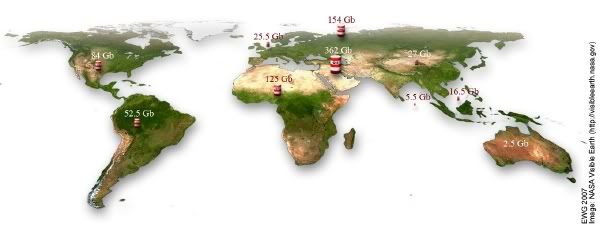(Cross-posted from Lotus - Surviving a Dark Time.)
This is going to be less analytical than I wanted, in fact it's not even what I had planned to write about, but the truth is I'm still sick and I'm afraid the dark cloud is readying another assault. So much for my good intentions to have a solid piece here to be read on Tuesday. I'm off to a great start.
Still, there is something I want to say.
Last week, the results of the latest household survey of Iraq were released. And, like everything else about our war, it provoked argument.
Performed by the Ministry of Health and the Central Office of Statistics in Iraq with technical assistance provided by the World Health Organization and funding by the UN, the major finding was that 151,000 Iraqis died from violence between the beginning of the invasion and June 2006.
The estimate[, WHO said in a press release,] is based on interviews conducted in 9345 households in nearly 1000 neighbourhoods and villages across Iraq. The researchers emphasize that despite the large size of the study, the uncertainty inherent in calculating such estimates led them to conclude [with 95% confidence] that the number of Iraqis who died from violence during that period lies between 104 000 and 223 000.
Despite the fact that it was the largest, most widespread household survey to date of Iraqi deaths, it was met with considerable skepticism in some quarters of the progressive blogosphere. Some groused about the fact the Iraqi government was involved; that, it was said, automatically made the figures more than suspect. And in fact, as AP noted, the new figure
closely mirrors the tally Iraq's health minister gave in late 2006, based on 100 bodies a day arriving at morgues and hospitals.
Actually, it's about 20% higher than that rate and the figure was considered shocking at the time because it was so much higher than earlier official estimates, but still, not that far off, and that agreement with an earlier claim by a government official raised some eyebrows. Others looked with narrowed eyes at the fact that
[m]ore than 100 neighborhoods, mostly in Baghdad and Anbar, could not be visited for safety reasons. So researchers estimated deaths in those areas by using a formula based on information from another group that tallies fatalities, the British-based Iraq Body Count.
Because IBC uses a very conservative method, counting only non-combatant deaths confirmed by at least two news accounts, various folks on the left dismiss it, some even charging that the group deliberately underplays the numbers in order to make the war seem, in the words of one, "a humane occupation." One blogger rejected the group's numbers as "discredited."
But ultimately, the objections were not about arcane points of methodology or the use of IBC figures. (Sidebar: The criticisms often read as though people thought the Iraqi/WHO survey simply used the IBC numbers for the areas the surveyors didn't dare go. If so, that's incorrect, since the study used "a formula based on" that data, which pretty clearly establishes the totals were extrapolated from IBC, not copied from it.) They were about one fact and one fact only:
The number reported by this survey is considerably below the 2006 Johns Hopkins survey which covered much the same period and reported 600,000 deaths by violence.
That's it. That was the actual concern. The new numbers just weren't big enough.
Now, there are reasons to suspect that the new numbers undercount the actual total. For example, NPR quotes study co-author Dr. Ties Boerma, Director of Measurement and Health Information Systems at WHO. The figures
"don't include car accidents and they don't include unintentional injuries," says Boerma. "They just include intentional injuries and armed conflict. In fact, the armed conflict deaths are more than 80 percent of the deaths we got reported."
Researchers left it up to the respondents to define the cause of death,
opening up the possibility of families not reporting some deaths because they thought of them as accidents. But that wasn't the problem.
AP notes that
many deaths go unreported in the chaos that has gripped the country, or the numbers may be tainted by sectarian bias. ... Muslim burial traditions add to difficulties - many families are believed to simply bury loved ones before sundown on the day of death without ever reporting the fatality.
But that wasn't the problem.
There is suspicion of the central government. Les Roberts, co-author of the Johns Hopkins study, suspects that lead families to be reluctant to admit a family member died violently. But that wasn't the problem.
A large number of Iraqis have fled the country and any violent deaths suffered within their families obviously would not be counted here. But that wasn't the problem, either.
No, the problem, again, the real problem, the core concern driving the doubts among progressive and liberal bloggers, was that the number reported by the Iraqi/WHO survey was considerably smaller than the one the reported by the Johns Hopkins survey.
That was the problem: a smaller and so, I gather, seemingly less politically useful number.
And oh my word, it makes my soul hurt.
Who the fuck cares? Suppose the death toll is "only" 150,000 instead of 600,000. So what? Is that supposed to matter, to make a difference, to justify any of the madness, mayhem, and murder?
I don't care which estimate is the most accurate. I don't! I don't care if it's 600,000, "only" (only???) 150,00, or even 84,000 (midpoint of the IBC range). I really do not care.
Isn't even that lowest figure horrifying enough? Aren't 84,000 dead humans important enough for our outrage? Do the dead in Iraq, coming so fast that there would seem barely enough time to mourn them, matter to us only as political talking points?
Yes, the IBC number, by definition, is a subset of the whole, yes, clearly the actual death toll is higher, probably considerably so. But even at that and maybe even because of that, isn't it enough? It's 48 non-combatant Iraqis killed a day, every day, since we invaded. It's a 9/11 for innocents every nine weeks for nearly five years.
Why are we even getting into these pissing contests about methodologies and universes and confidence levels? Why do we seem to find it necessary to maximize the devastation? It's said that one death is a tragedy, 50 deaths is a horror, and 5,000 deaths is a statistic. Is that all the Iraqis have become to us? Statistics for scoring political points?
I say, let the statisticians argue it out. Because I don't care. Because the fact is, even the lowest estimates can't wash the rivers of blood from our hands. Because while it'd be good to know the truth of the numbers, whatever they are, the truth of the war does not depend on them.
Meanwhile, as we look to score our political points and pore over our Clinbama polls, that war continues with our passive support.
Yes, our support. After all, we still pay our taxes for the Pentagon.
Candidates who actually would stop the war remain in single digits.
The walls of Congress and the White House still stand in the notable absence of hundreds of thousands, millions, of bodies pressing on them. (I'm reminded of the story that during Vietnam, Lyndon Johnson once rejected a Pentagon request for more troops to escalate the war by asking the brass to calculate how long it would take 100,000 angry Americans to "climb the White House wall and lynch their president.")
The convoys, the deployments and re-deployments and re-re-deployments, continue unhampered and unimpeded by people blocking their way.
Business goes on, that is, pretty much as usual here. And death goes on, pretty much as usual, in Iraq.
Few - very few - of us have actually done what we can to stop the war. Not what we comfortably can, not what we conveniently can, what we actually can. Our guilt as war opponents may be less, but we are not guiltless. The blood stains may not be as deep, but they are there.
How many have to die before it engages our moral rather than merely our political outrage?
Footnote: The Iraqi/WHO survey report, in .pdf format, is at this link.
There's more:
"Numbers as numbers" >>















 "Iran's senior-most leaders promised Iraq's that they would stop funding, arming, training and directing of militia extremists and other elements in Iraq that were creating security challenges," Petraeus said. "We are waiting, frankly, to see that carried out."
"Iran's senior-most leaders promised Iraq's that they would stop funding, arming, training and directing of militia extremists and other elements in Iraq that were creating security challenges," Petraeus said. "We are waiting, frankly, to see that carried out."

